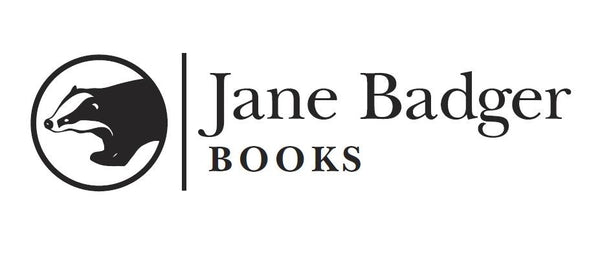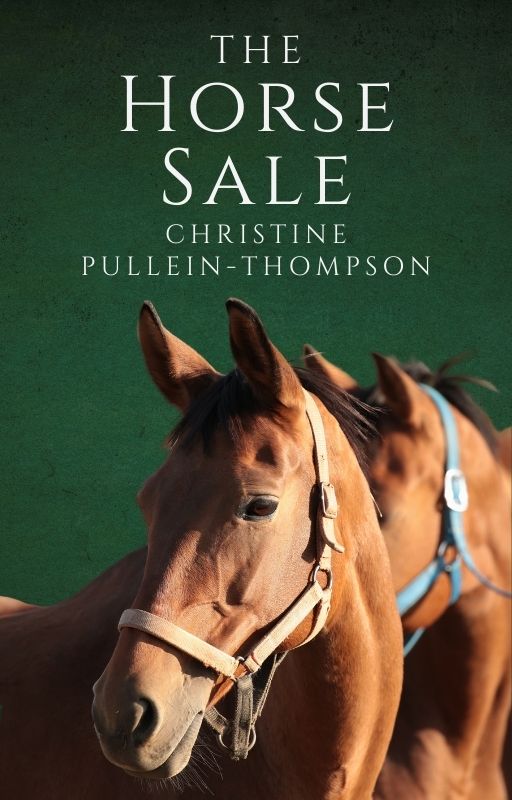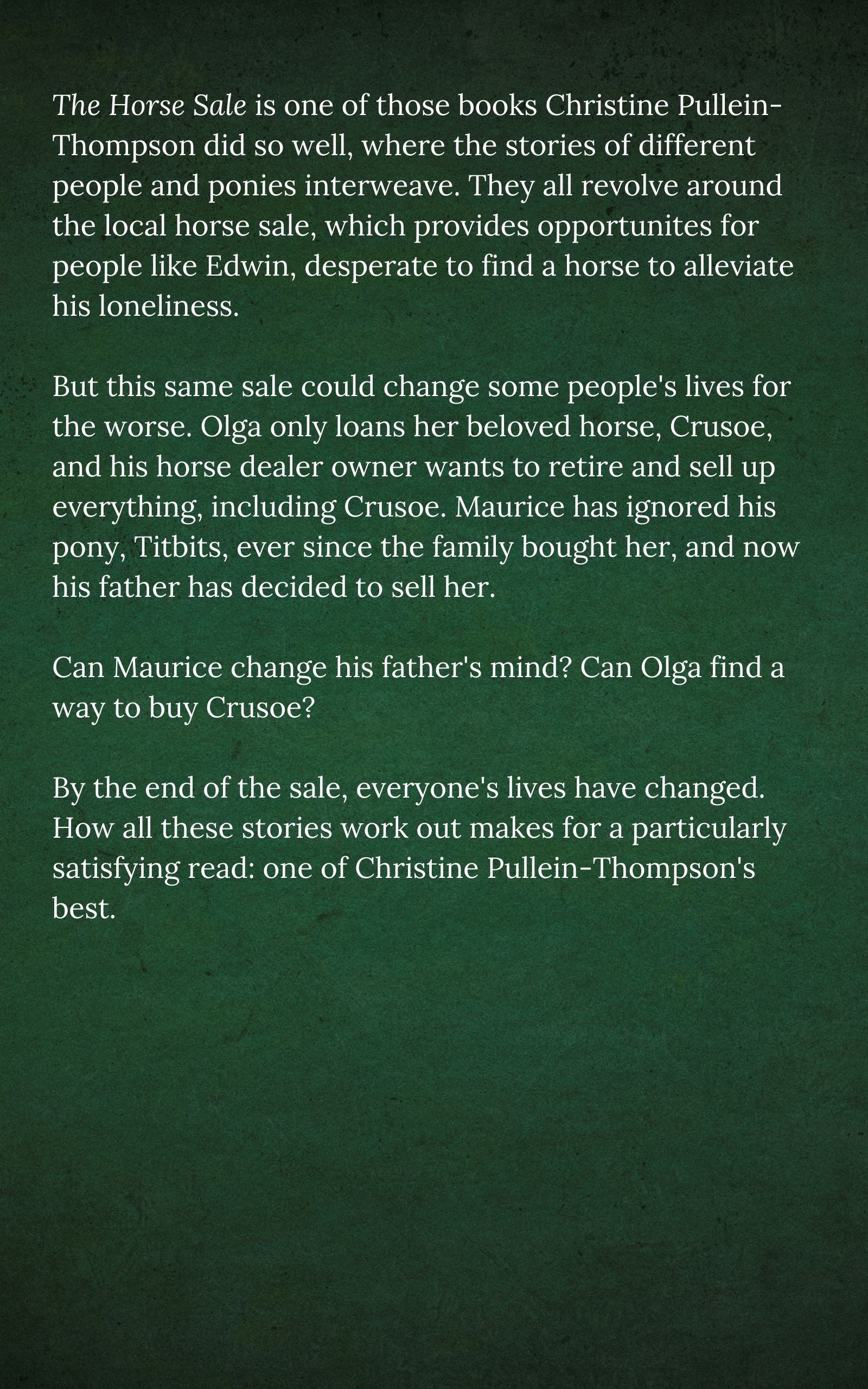Jane Badger Books
Christine Pullein-Thompson: The Horse Sale (eBook)
Christine Pullein-Thompson: The Horse Sale (eBook)
Couldn't load pickup availability
Share
Can Maurice change his father's mind? Can Olga find a way to buy Crusoe?
By the end of the sale, everyone's lives have changed. How all these stories work out makes for a particularly satisfying read: one of Christine Pullein-Thompson's best.
Page length: 150
Original publication date: 1960
How do I get my book?
How do I get my book?
There's a link to download in your confirmation email. If you need help, the email from Bookfunnel, who handle our delivery, will walk you through downloading the file that works best for you.
How do I read my eBook?
How do I read my eBook?
You can read the ebooks on any ereader (Amazon, Kobo, Nook), your tablet, phone, computer, and/or in the free Bookfunnel app.
Read a sample
Read a sample
OLGA DAVIS was sixteen, with dark hair cut in a fringe and green slanting eyes. She was slim with a retroussée nose. She didn’t like the way she looked; she would rather have had brown or blonde hair, a round face and pink cheeks. At sixteen she was already sick of people saying, “But you’re not English, are you? Anyone can see that.”
“My mother is half-Italian; my father is an English artist,” she would answer in her rather distant voice.
The Davises lived in an old house with one enormous room which seemed to dominate all the others. It was in that room that Mr. Davis painted. They had renamed the house, appropriately, The Studio.
Olga could draw; she had won an art scholarship to her present school, but she didn’t wish to be an artist. If anyone suggested it, she would reply, “No, thank you. I’ve had enough art to last me a lifetime.” The person she really liked, if you can call him a person, was Crusoe, a dun fifteen-two gelding, whom she had had for nearly a year, and whom she hoped one day to buy. He belonged to a disreputable horse dealer called Jackson, whom she had met one day at a horse show. On that occasion she had been leaning against the ring ropes watching other people ride. She was thinking, if I had a horse, if only … If only Daddy was commissioned to do a portrait of the Prime Minister, was suddenly acclaimed, if only someone would leave me a thousand pounds … if only … if only what? And then as if in answer a voice spoke.
“Ain’t you got a ‘orse to ride then?’’ it asked. For a moment she couldn’t imagine who had spoken. Then she saw a man standing beside her leaning heavily on a stick. His breath smelt of beer; a watch chain stretched across his ample stomach. He wore looselaced black boots. She took him in with the eye of an artist. “That’s right,” she said.
“That seems a pity, don’t it? You look as though you can ride too,” the man said, peering at her with small bleary eyes. Olga thought, perhaps he’s drunk; and she started to move away. “Hi, missy, my name’s Jackson. I thought I might be able to ‘elp you,” said the man.
She stopped and looked back. In the ring the musical poles had started. “Help me?” she asked.
“I do a spot of dealing, you see. Just on the side, see. I do a spot of everything, if it comes to that,” said Mr. Jackson.
Olga thought that was what Mr. Jackson looked like – dealer in rags and bones and junk. “I don’t think anyone can help me. My parents don’t want me to have a horse, and I haven’t any money. Thanks all the same … ” she said.
“Don’t keep running off, missy,” said Mr. Jackson, taking her arm. “You young people are in too much of a hurry, tearing here, tearing there. You don’t know how much you miss.”
“What the eye doesn’t see the heart doesn’t grieve over,” quoted Olga.
“I’ve got a horse I thought you might like to use, just for the time being. He’s a dun; can jump like a stag. All he needs is a bit of ‘andling. Just your size,” Mr. Jackson said in a coaxing voice. And of course she had fallen: her voice had changed; the whole extraordinary meeting had assumed the proportions of a miracle. How had he known the one thing she wanted more than anything else was a horse of fifteen-two?
She had persuaded her parents with difficulty. Three days later Crusoe had arrived in a shabby cattle truck. He had walked down the ramp with his big hoofs slipping all over the place, his ribs sticking out, his mane standing straight up like a zebra’s. The only virtue he had had was character. Mr. and Mrs. Davis knew nothing about horses. “I hope he won’t cost a lot to feed,” they kept saying. “What about the winter, won’t he need a shed?”
“I’ve arranged to rent a field for seven and sixpence a week. It has a shelter luckily,” Olga said, patting Crusoe. “Don’t you think he looks clever? I’m sure he will jump.”
But all that had happened a year ago, now Olga was sixteen and after a year of trial and error she could manage Crusoe at last. She had been schooling him across country for six months. She planned to ride him in competitions, to show-jump him. It was April and the summer ahead was full of such plans. It hadn’t been easy. She had painted Christmas cards and sold them to pay for his shoes, she had borrowed five pounds from an aunt to supplement his hay. Even so he was still on the thin side.
Sometimes she would sit in her room, which was at the top of the house, and which she called her garret, and wonder why life was so difficult for her. She would wish her father was still a salesman instead of a struggling artist, that she had a practical mind herself instead of an artistic one, which made her forget things. She would count her savings which never seemed to grow and which she kept in a box in the bottom drawer of her chest-of-drawers. She would wish she had a television set like the Conrads. And then at last she would turn on her battered portable wireless and listen to some gay music, rock ‘n’ roll or jazz and start to dream about the future, about what she and Crusoe would do together, and the mass of annoyances and the poverty which pursued her through life would fade away and she would be riding across country with the loudspeakers blaring her name, her crash cap rammed on her head, Crusoe going strongly, jumping all before him with the courage she knew he had. Presently she would be pacing the room, saying, “Olga, you’re going to do it, nothing’s going to stop you. One can do anything if one wants to badly enough.”
She would stop by the looking-glass and see herself not dressed as she was but spattered by mud, tired but victorious. Of course there was always the let down. Her mother would call, “Olga, darling, tea.” Or her father would bang on her door and say, “Turn down your wireless a bit. I can’t even think with that commotion going on, much less paint.” And Olga would be back with reality. She would creep downstairs then, cross the road, and join Crusoe in his paddock. He was always pleased to see her, would cock his ears back and listen and though she knew he was ugly, she loved him for his ugliness. Olga’s only nightmare was a dream about Crusoe—it was that she would wake up one morning and find him gone …
Who's in the book?
Who's in the book?
Humans: Olga, Edwin, Maurice, Julia, Miss Marsh, Miss Thorne, Jock and Janet Payne, Barry, Mr and Mrs Norman
Equines: Crusoe, Titbits, Jupiter, Venus, Mercury, Whisky, old Poppit
Other titles published as
Other titles published as
Series order
Series order
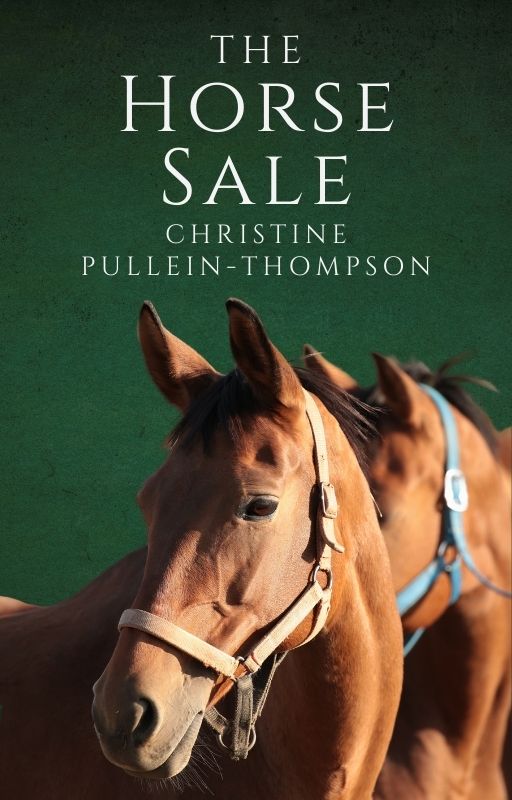
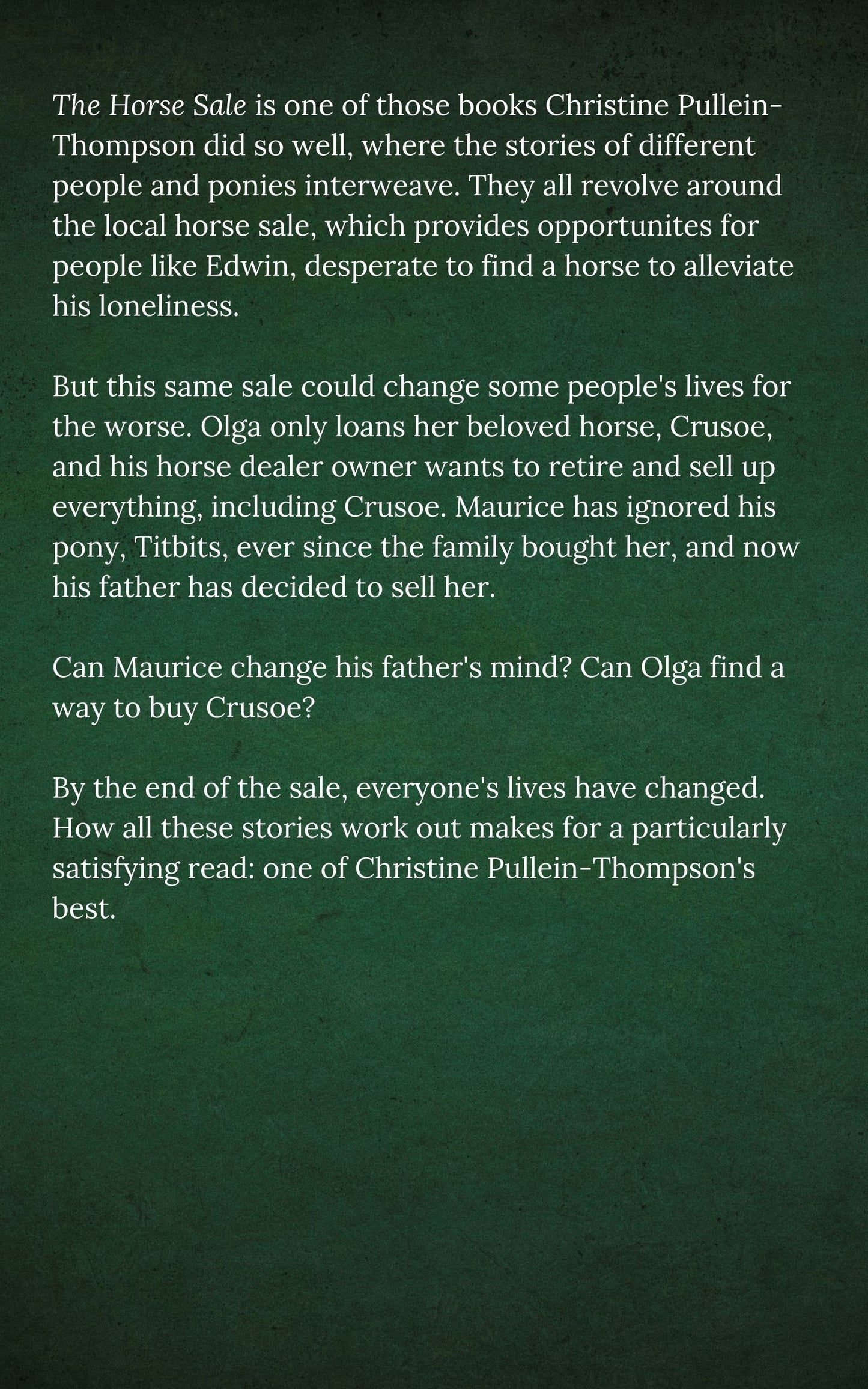
I really enjoyed this book . It describes a trip to a horse sale so well. Very satisfying story
I liked the complexity of the plot. Each person and horse has a different story leading them to the horse sale.
